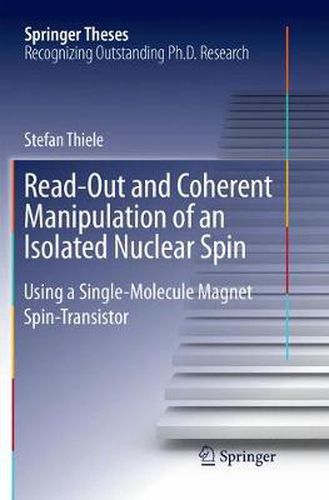Readings Newsletter
Become a Readings Member to make your shopping experience even easier.
Sign in or sign up for free!
You’re not far away from qualifying for FREE standard shipping within Australia
You’ve qualified for FREE standard shipping within Australia
The cart is loading…






This title is printed to order. This book may have been self-published. If so, we cannot guarantee the quality of the content. In the main most books will have gone through the editing process however some may not. We therefore suggest that you be aware of this before ordering this book. If in doubt check either the author or publisher’s details as we are unable to accept any returns unless they are faulty. Please contact us if you have any questions.
This thesis sheds new light on the worldwide first electrical manipulation of a single nuclear spin. Over the last four decades, the size of a bit, the smallest logical unit in a computer, has decreased by more than two orders of magnitude and will soon reach a limit where quantum phenomena become important. Inspired by the power of quantum mechanics, researchers have already identified pure quantum systems, having, analog to a classical bit, two controllable and readable states. In this regard, the inherent spin of electrons or nuclei with its two eigenstates, spin up and spin down, is a promising candidate. Using expertise in the field of single-molecule magnets, the author developed a molecular transistor, which allows quantum information to be written onto a single nuclear spin by means of an electric field only, and, in addition, enables the electronic read-out of this quantum state. This novel approach opens a path to addressing and manipulating individual nuclear spins within a very confined space (a single molecule), at high speed. Thus, the author was able to show that single molecule magnets are promising candidates for quantum information processing, which is triggering a new field of research towards molecular quantum electronics.
$9.00 standard shipping within Australia
FREE standard shipping within Australia for orders over $100.00
Express & International shipping calculated at checkout
This title is printed to order. This book may have been self-published. If so, we cannot guarantee the quality of the content. In the main most books will have gone through the editing process however some may not. We therefore suggest that you be aware of this before ordering this book. If in doubt check either the author or publisher’s details as we are unable to accept any returns unless they are faulty. Please contact us if you have any questions.
This thesis sheds new light on the worldwide first electrical manipulation of a single nuclear spin. Over the last four decades, the size of a bit, the smallest logical unit in a computer, has decreased by more than two orders of magnitude and will soon reach a limit where quantum phenomena become important. Inspired by the power of quantum mechanics, researchers have already identified pure quantum systems, having, analog to a classical bit, two controllable and readable states. In this regard, the inherent spin of electrons or nuclei with its two eigenstates, spin up and spin down, is a promising candidate. Using expertise in the field of single-molecule magnets, the author developed a molecular transistor, which allows quantum information to be written onto a single nuclear spin by means of an electric field only, and, in addition, enables the electronic read-out of this quantum state. This novel approach opens a path to addressing and manipulating individual nuclear spins within a very confined space (a single molecule), at high speed. Thus, the author was able to show that single molecule magnets are promising candidates for quantum information processing, which is triggering a new field of research towards molecular quantum electronics.